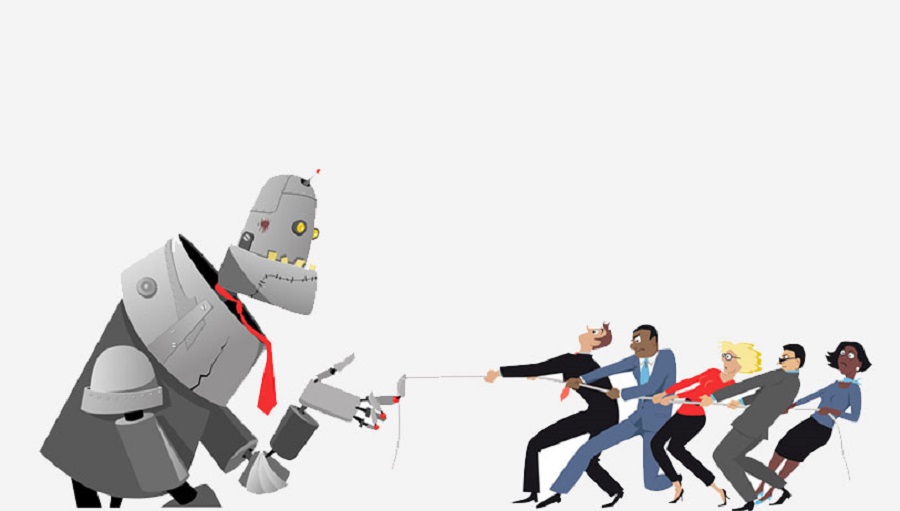John McCarthy proposed the concept of Artificial Intelligence in 1950. Experts expect a disturbingly deep integration of this very term by 2050.
It may have you walking out of a supermarket with a cart filled to the top. But without stopping by a cash counter.
It feels almost illegal. No?
Imagine petting a robot-dog and hopping into your car to sit idly as the car self-drives to your destination. Or maybe imagine a flying vehicle like that of Dr. Heinz Dooferschmirt’s from Phineas and Ferb, delivering your orders from Amazon.com.
(I’d now ask you to imagine an alien invasion and your AI defenders protecting you….but well, pfft. Let’s not get ourselves into a sci-fi movie here.)
The point is it took us less than a century to transform the whole stage. Today, human beings are not the only intelligent residents on this planet.
AI stands second in the row – which, of course, is a major concern. Have we birthed a threat? Are our inventions going to replace us sometime soon?
Or have we been, just plain, smart?
Let’s figure it all out.
Artificial Intelligence & Human Society
How deep into the waters are we?
As I said, the term AI-first surfaced about 70 years ago. Although that’s quite a lot of time, it doesn’t come to us as a surprise that only 1500 prominent US business leaders recognized it back in 2017. They weren’t quite able to perceive it as a developing branch of computer science that dealt with the incorporation of human intelligence in machines and machine systems.
Nevertheless, 2021 witnessed some astonishing advancements. Currently, 86% percent of businesses are enhancing their customer care with the effective use of artificial intelligence. 25% of leading businesses expect a substantial increase in revenue.
AI has already penetrated deep into logistics, supply chain, E-Commerce, finance, and banking sectors. From shipping effortlessly to transacting amounts with absolute safety, artificial intelligence is cutting down the workload by half.
Again, that brings us back to the unsettling question: is this technology replacing Humans and consequently ruling their social implications?
To answer that in one word: Yes. Artificial intelligence is replacing Human beings.
Whether it’s for the better or not, let’s consider a few examples.
Transforming Job Roles
Boosting creativity and innovation is amongst the major domains wherein AI is helping us out. Ever since the industrial revolution, a large portion of the human population has been killing its thinking capabilities. They are spending their days completing mundane, repetitive tasks, such as verifying documents, responding to emails, packing goods, etc.
Effective use of artificial intelligence is eliminating the need for human involvement in these tasks. For example, banks prefer AI cognitive automation for document verification tasks instead of hiring separate staff.
Now, such replacements are cutting down employment opportunities. We expect about 30 percent of occupations to become extinct by 2030.
But then again, the emergence of AI demands a new set of minds capable of handling AI maintenance and development. And, so we also expect to see an increase in job roles in technical fields, including AI machine educators, AI system designers, AI to human interface management, and AI security.
Revolutionizing Data Security
We, humans, have an edge for errors. Even after doing a task on repeat for years, we may end up committing a blunder now and then. With artificial intelligence, the case is the opposite.
Well-programmed AI systems and devices yield accurate results. Thus, promising nothing less than perfection.
Naturally, this is a win-win factor when it comes to data security and cybersecurity. The thoughtfully programmed systems automatically fix bugs, monitor, control, and transmit data when need be. Thus, avoiding glitches, which may lead to data loss or unintended exposure.
However, it is important to note that data is now not at the mercy of human emotions – which is perhaps one of the major drawbacks of robots. With all data available to the machines and power-hungry hands controlling them, personal data may be subject to abuse.
Impacting Cognitive Thinking
It is undebatable that the advancement in technology is gradually changing our brains. For example, with smartphones, we no longer feel obligated to remember anything as we can store data in it. As a result, our memory retention is weakening.
Similarly, AI technology in the form of virtual assistants is taking away our memory exercises. Whenever we need to know or remember something, we approach Siri or Alexa.
Instead of trying to remember, we rely on technology to assist us. This particular practice has increased our tendency to forget.
Another example is planning routes before going somewhere. Today, we no longer look at maps and plan routes. Instead, we heavily depend on GPS that has weakened the spatial orientation of our brains.
Considering these, it is quite evident that AI technology has been impairing human cognitive thinking. However, on the positive side, it is freeing up our minds for more creative and artistic work.
While AI handles all the manual and mechanic work for us, we can focus on those requiring complex yet creative thinking. Hence, this leads to focused thinking that can increase our overall productivity.
Key AI Vision: Replacement Augmentation
On the surface, the drastic changes brought about by artificial intelligence may appear frightening. But the truth is, it isn’t.
Artificial intelligence can only imitate & replicate our intelligence. It cannot give birth to newer ways of thinking. Or involve intuition, emotion, and sensitivity. These elements set us to a higher standard.
Artificial intelligence is, at best, an extension of human beings that depends on us for functioning. As long as we’ve got that all clear and transparent in our head, nothing can replace human beings or direct our way of life. Give it a thought!

